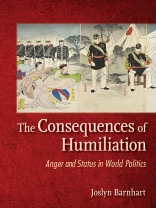The Consequences of Humiliation explores the nature of national humiliation and its impact on foreign policy. Joslyn Barnhart demonstrates that Germany’s catastrophic reaction to humiliation at the end of World War I is part of a broader pattern: states that experience humiliating events are more likely to engage in international aggression aimed at restoring the state’s image in its own eyes and in the eyes of others.
Barnhart shows that these states also pursue conquest, intervene in the affairs of other states, engage in diplomatic hostility and verbal discord, and pursue advanced weaponry and other symbols of national resurgence at higher rates than non-humiliated states in similar foreign policy contexts. Her examination of how national humiliation functions at the individual level explores leaders’ domestic incentives to evoke a sense of national humiliation. As a result of humiliation on this level, the effects may persist for decades, if not centuries, following the original humiliating event.
Tabella dei contenuti
Introduction
1. National Failure and International Disregard
2. Withdrawal, Opposition, and Aggression
3. National Humiliation at the Individual Level
4. The Cross-National Consequences of Humiliating International Events
5. Soothing Wounded Vanity: French and German Expansion in Africa from 1882 to 1885
6. ‘Our Honeymoon with the U.S. Came to an End’: Soviet Humiliation at the Height of the Cold War
Conclusion: The Attenuation and Prevention of National Humiliation
Circa l’autore
Joslyn Barnhart is Assistant Professor of Government at Wesleyan University.












